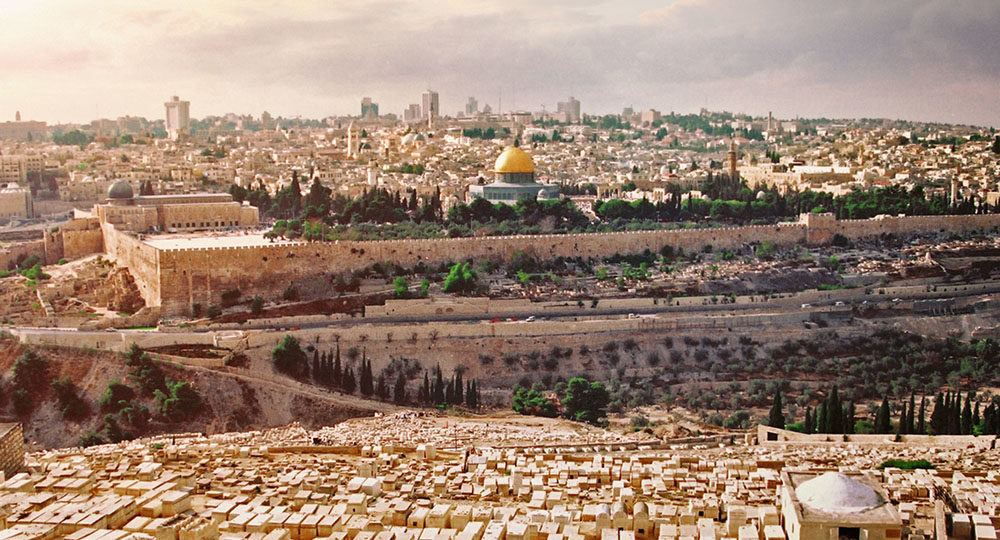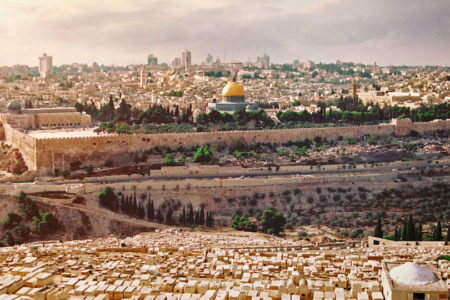Israel’s New Reality
“People don’t judge you by your achievements but by your projections for the future.”
This statement, made by former Israeli Prime Minister Shimon Perez, may have paved the way for his failure in May to be officially elected to that position. By the narrowest of margins (less than 30,000 votes), Israelis focused on actions (four suicide bomb attacks by Islamic terrorists that killed 59 men, women, and children over a nine-day period) more than on the projection of a quick peace with the PLO. Jewish Israelis sent a clear message (Benjamin Netanyahu received 55 percent of the Jewish vote) that they want peace, but with some assurance of security.
Perez, believed by many to be a perpetual dreamer, became captive to an impossible dream—a dream of peace and cooperation with Israel’s neighbors. This was an impossible dream because it was completely devoid of reality. Reality is defined as the totality of real things and events. While everyone in Israel would love to project a future wrought with the dividends of peace, the totality of real things and events just does not make that possible.
There is a reality in Israel that cries out for what Sergeant Friday of the TV series Dragnet used to ask when investigating a case: “Just the facts, please.” Three areas of fact give a clear picture of what the reality actually is in Israel.
Reality I: Treaties
The Oslo I agreement, signed in Cairo, Egypt, in May 1994, provided for Gaza and Jericho to be turned over to the Palestinian Authority (PA). Oslo II was signed on September 28, 1995, on the White House lawn, paving the way for six more territories to be gradually turned over to the PA. As of this writing, five of these territories—Jenin, Tul Karm, Qalqilyah, Nablus, and Bethlehem—have been transferred. Hebron awaits action because of the flourish of terrorist activity there.
In addition, Oslo provided for the first election of a Palestinian leader. As expected, Yasser Arafat was elected President of the self-rule council on January 20, 1996. The Palestinian National Council (PNC) consists of 88 elected seats. In exchange for agreeing to the provisions of Oslo, Israel is to receive an official revocation of the PLO Covenant, which calls for the liquidation of the Zionist presence in Israel. It all sounds wonderful, but it is not the reality of Israel.
On April 24, 1996, the PNC met, barring all journalists from the session as they dealt with the Covenant. No official roll call was ever released to show how the individual PNC members voted. Two statements, one in English and another in Arabic, were released. They were not direct translations and actually differed in content. The English version said that the Covenant was canceled, but the Arabic version said it was frozen, to be dealt with within six months. Two-thirds of the 669 members were needed to change the charter. Because of the secrecy of the meetings, no one knows the actual results. The official statement read, “All articles which contradict the letters of mutual recognition which denied Israel’s right to exist in the area and spoke of war for the liberation of Palestine are canceled.” When asked the exact number of the 33 articles involved, the official answer given by the attorney general of the PA was, “Most.” Israeli Prime Minister Benjamin Netanyahu, speaking as Candidate Netanyahu, reacted to the vote by saying, “It smells like a con job.”
Reality II: Territory
The second reality for Israel is the status of the Jewish settlements in the Palestinian-controlled areas. The news pundits would have us think that only a few religious fanatics reside in the Jewish settlements and that they have no legitimate stake in the land. Interestingly, a poll of settlement residents sponsored by the Center for Palestine Research and Studies, a Palestinian think tank, produced some startling results. At least 50 percent of Israelis polled consider themselves traditional or secular Jews, not Orthodox. Most are sabras—that is, native Israelis who have an economic rather than a religious reason for being there. The majority consider their income average or above average, and most are employed on the West Bank. These views have caused many intellectual Palestinians to rethink the idea that all settlements must go, as they are profitable to the economy.
Abd al-Shafi, head of the Palestinian negotiating team, calls the ongoing Israeli settlement activity incompatible with Palestinian goals. For the 50 percent who are Orthodox, some facts about the settlements point to possible future difficulties in their worship. Of the 23 holy places located on the West Bank and in Gaza, four have special provisions for Jewish worship in the Oslo agreement. The remaining 19—comprised of cemeteries, tombs, and synagogues—are placed at the discretion of the Palestinian Council. Hassan Tahbub, Minister of Religious Affairs, has stated emphatically that Jews will be permitted to visit and pray at any site unless the Palestinians consider that place to be a mosque. Islam does not allow for joint worship; therefore, in those cases Jews would be denied the opportunity to worship. Hassan’s statement makes for an unholy mess in the region.
With the ultimate goal of Jerusalem as the capital of a Palestinian state, future negotiations do not look promising. In addition, uncertain security hovers like a dark cloud over the Jewish settlements, to say nothing of the several Jewish towns that border the West Bank. The reality of an armed Palestinian police force, 20,000 strong, surrounding the Jewish settlements and within minutes of Israeli towns in the pre-1967 borders is a real concern (see map). This is a problem that Israel has tried to address by spending an estimated $100 million on a network of 20 bypass roads intended for the exclusive use of Israelis.
Reality III: Terrorism
The third reality for Israel is the constant threat of terrorism. Three Islamic fundamentalist groups—Shi’ite Hizbullah, Sunni Hamas, and Islamic Jihad—target civilians for death through suicide bombings. These groups, funded by Iran and harbored by Syria, do not recognize Israel’s existence as a state, much less as a living people.
Hamas’s written manifesto involves their ten principles of faith, which are as follows:
- Hamas swears to conduct holy war over Palestine against the Jews until Allah’s victory is achieved.
- The land must be cleansed of the filth and evil of tyrannical conquerors.
- Under the wings of Islam, it is possible to have peaceful coexistence with other religious groups. But without Islamic rule over the Dome of the Rock, there can only be hatred, controversy, corruption, and repression.
- By command of the Prophet, Muslims must fight the Jews and kill them wherever they are.
- Hamas strives to set up an entity wherein Allah is the highest purpose, the Koran is its law, Jihad [holy war waged on behalf of Islam as a religious duty] is its means, and dying for the sake of Allah is the noblest wish.
- Palestine is a holy Islamic entity until the end of time. Therefore, it is non-negotiable and no one can give up any part of it.
- It is a personal, religious commandment for every Muslim to engage in the Jihad until the land is redeemed.
- Hamas opposes any kind of international talks or negotiations, as well as any possible peace arrangement. Sovereignty over it means giving up some measure of control by [Islam’s] believers.
- The Jews control the media and the world financial institutions. By means of revolution and war, and organizations…they undermine human society as a whole in order to destroy it. By their evil corruption they try to gain domination of the world by such institutions as the United Nations and its Security Council. More details of their iniquity can be found in the Protocols of the Elders of Zion.
- Hamas opposes any secular state the PLO would seek to create in Palestine, since by definition it would be anti-Islamic. On the other hand, if the PLO would adopt Islam and follow its flag, all its members would become freedom fighters who would light the fire to consume the enemy.
Under the Oslo agreements, Israel has had to rely on the PLO to locate and stop Hamas from carrying out its violent terrorist acts. This has not always happened as planned. Certainly, the February and March bombings proved as much.
Hizbullah has its own 13 principles of warfare. The first of these principles is to avoid the strong and attack the weak; thus, the constant barrage of Katusha rockets directed at, not the Israeli military, but the citizens of Kiryat Shemonah, the northernmost Israeli town. When Israel conducted the “Grapes of Wrath” operation into Lebanon to counter these brazen acts, Hizbullah instituted two more of its principles: operating among civilians, and using the media to display the scenes of carnage brought about by Israeli retaliation.
The reality of these events is clear. If Lebanon can do nothing to stop acts of terrorism coming from the North, will the predominantly Muslim Palestinian Authority do any better on the West Bank? It doesn’t seem so. In light of the terrorism, Israel has had to close the borders of Gaza, thus preventing many Palestinian workers from getting to their jobs. According to the June 27, 1996, issue of Jerusalem Report, one Palestinian said, “The situation was bad before the arrival of the Palestinian Authority, and it’s got worse since. Under Israeli rule we lived better.” A taxi driver said, “When Menachem Begin was the Prime Minister and hard-liner Ariel Sharon was Minister of Defense, then everything was open to us. There were no borders.” A father of five in his 30s said, “OK, there’s no fear, but there is no food either.” This third reality shows that neither side is better off.








